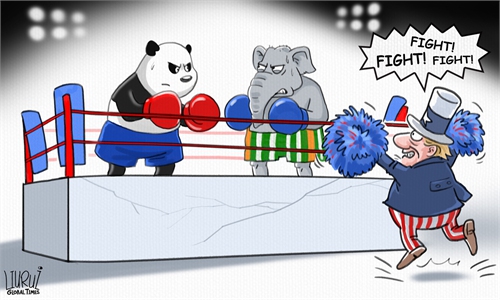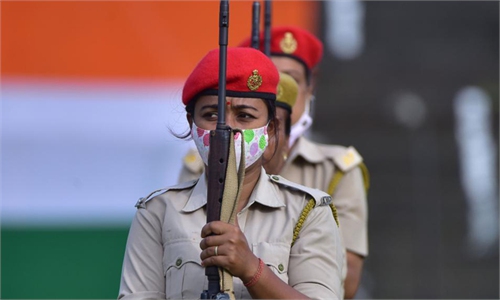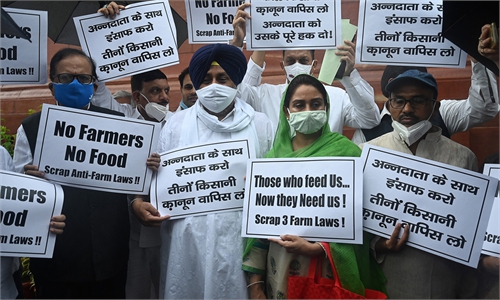India's version of the "Watergate scandal" and a series of political storms and farces in the parliament have revealed India's parliamentary democracy is in crisis, international analyst have said, after Indian opposition leaders from 15 parties heightened protests against the central government over the Monsoon Session from July 19 to August 11 with an increase in chaos, scuffle, and adjournments.
India, self-identified as the world's largest democracy, has long boasted about its political system in the domestic and Western media,Hu Zhiyong, a research fellow at the Institute of International Relations of the Shanghai Academy of Social Sciences, told the Global Times on Sunday.
However, the farce repeatedly staged in its parliament, as well as the chaos of India's domestic politics in recent years, confirmed again that India's parliamentary democracy grafted from the West is still not well-adapted after a history of more than 70 years, he said.
Facts have proved that the "Indian democracy" has degraded to an empty slogan while the Indian parliament stuck in its own inefficiency.
Experts consulted by the Global Times pointed out that the democratic model copied from the West has brought political instability, ineffective governance, failed anti-epidemic containment efforts and sluggish economic development.
They predicted the gap between India and China will grow larger if India continues to struggle to find a development path suited to its own national conditions.
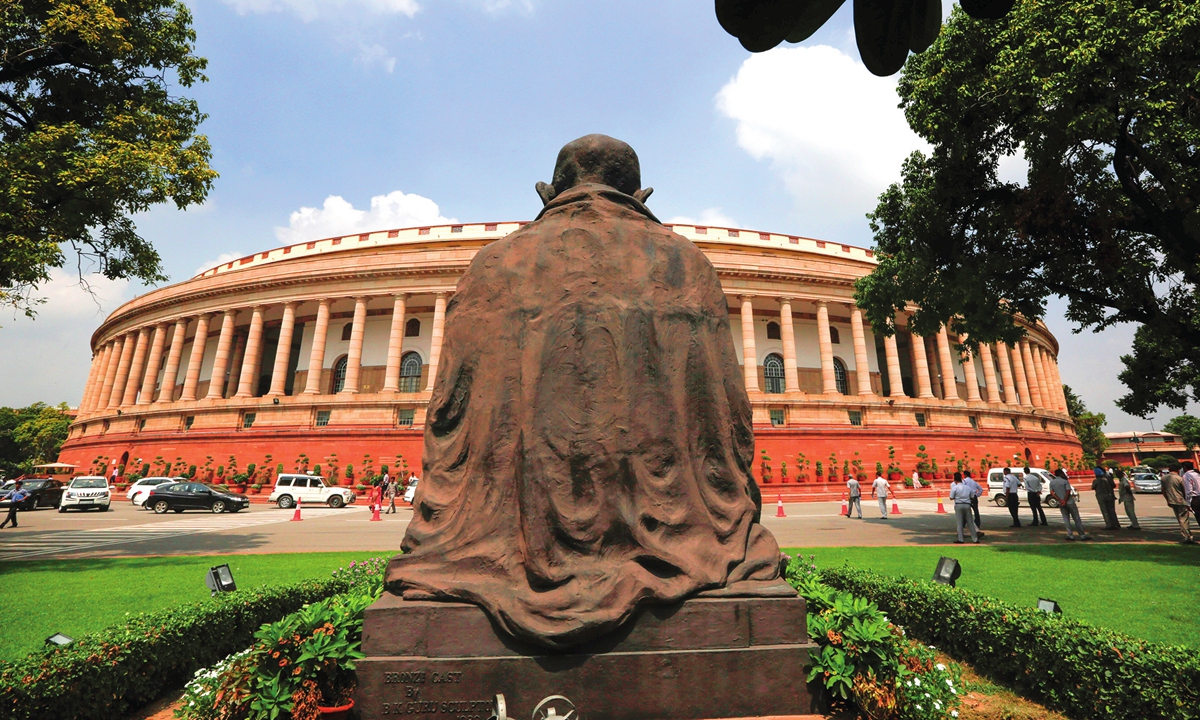
A statue of Mahatma Gandhi overlooks the Indian parliament house Photo: AP
Dysfunctional parliament reflects the vanity of Indian democracy
Opposition leaders from 15 Indian political parties, led by Congress leader Rahul Gandhi, protested against an alleged surveillance operation by the ruling government using the Pegasus spyware. The complaint disrupted proceedings in Lok Sabha and did not allow the treasury benches to transact any business for the second consecutive day - signaling that the first week of the Monsoon Session would be a washout, Indian Express reported.
India's main opposition Congress party has accused Prime Minister Narendra Modi of "treason" and compromising national security following revelations that dozens of Indians were potential targets of snooping by Israeli-made spyware, Al Jazeera reported.
Stormy scenes were witnessed in Lok Sabha, or House of the People, where the opposition raised slogans and brandished placards demanding the resignation of the Prime Minister and Home Minister over the alleged surveillance. Uproar over this was also seen in Rajya Sabha, or the upper house of the bicameral Parliament of India.
In online videos shared by some MPs, a bound rule book was flung at the chairperson's seat, and some opposition MPs were seen sitting on tables after tearing up papers and some even physically clashed with security force.
Similar incidents also occurred in the Indian parliament in March and September last year over the disputed agricultural reform. Some PMs exchanged blows inside the parliament and tore up the file to voice their anger.
India's parliament was increasingly unable to play a healthy role in the country's governance amid a political system riddled with loopholes.
Hu introduced to the Global Times that according to the Constitution of India, the main function of parliament is to enact laws, and it also has important powers such as financial and administrative supervision. But in practice, the session and agenda of the Federal Parliament are mainly controlled by the Council of Ministers headed by the Prime Minister, and the bills proposed by individual parliamentarians have little chance of passing into law.
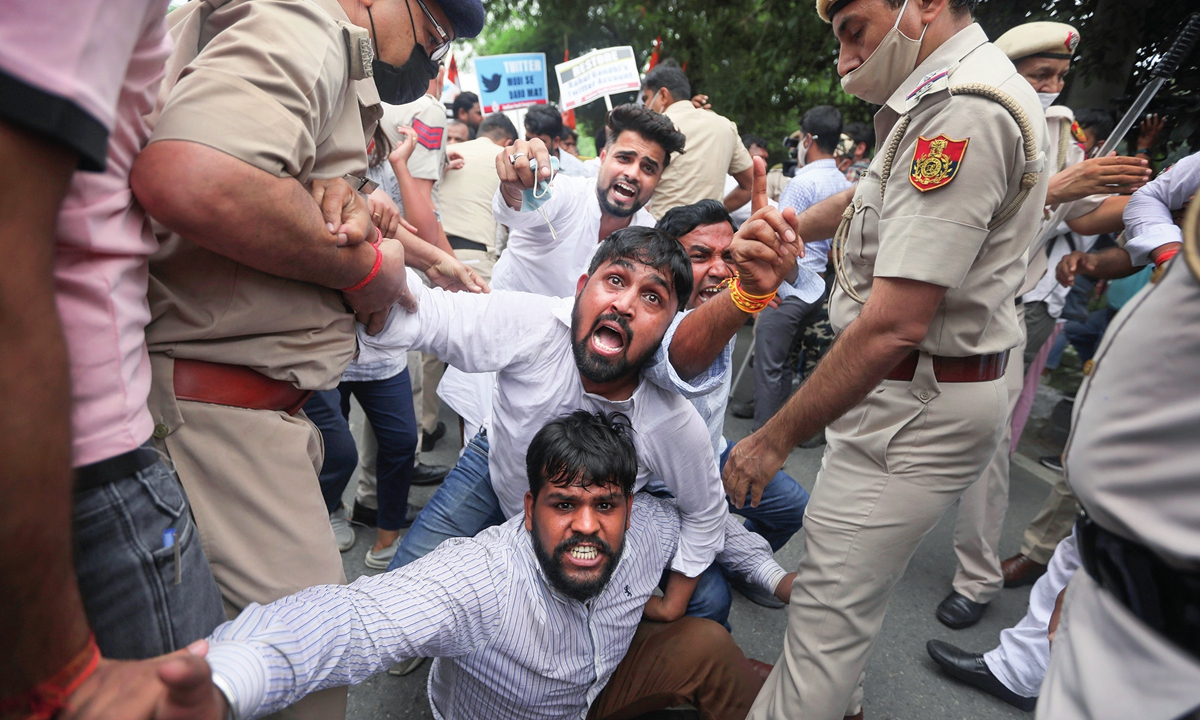
Police detain congress party workers during a protest outside Twitter's office in New Delhi, India on August 9, which was against Twitter temporarily locking Congress party leader Rahul Gandhi's account. Photo: AP
The observers analyzed that the opposition parties had no choice but to take the extreme option of disrupting the Monsoon parliamentary session to express their dissatisfaction and vent out their anger to make their voices heard more.
During this monsoon session, the Modi administration paid no attention to the demands of the opposition parties and brutally pushed through 20 bills, including the bankruptcy law amendment, the vast majority of which were passed without necessary discussions but simply through voice vote, in which there were 14 bills passed in the LokSabha after only spending 10 minutes or less in deliberation, The Hindu reported.
"The ruling party's failed policies were not effectively held accountable in parliament," Qian Feng, director of the research department at the National Strategy Institute at Tsinghua University, analyzed in an interview with the Global Times.
For instance, although opposition parties and the public were very unhappy with the Modi government's failure to fight the epidemic, no substantial accountability initiatives could be introduced after a brief thematic debate in the Rajya Sabha, local media reported.
Also, for the controversial Pegasus Project, due to the BJP MPs' refusal to participate in the talks, the meeting of the Standing Committee on Information Technology led by opposition MPs to discuss the alleged case of using the software to spy had to be cancelled, the Hindustan Times reported.
"It cannot be denied that India's parliamentary system has played a positive role in national processes over the past 75 years, such as consolidating Indian unity and stabilizing national politics. However, the contradictions between caste and ethnicity, and local and central governments are very complex," said Qian, adding that the conflict has endured endless debates between the ruling and opposition parties over economic reform policies which have brought great stagnation to the long-term development of India's economy.
"Increasingly, parliament has become an inefficient and repetitive operation," Qian told the Global Times.
Downgrading of Indian's democracy
The repeated scuffles at the India's parliament in recent years have shown that Indian-style democracy has inherited only the veneer of democracy left behind by the British but lacks the core of democracy, experts say.
With a rich living experience in India, Hu can personally feel in his daily life that complex issues such as religion and other essential conflicts in land control and labor unions remain unsolved, which are hindering the country's development.
India is a major agricultural country, with farmers accounting for 70 percent of the country's population. In the 2019 general election, Modi's Bharatiya Janata Party (BJP) managed to win more farmer votes and was re-elected with an overwhelming majority.
However, the year after the general election, Modi's administration rammed through a set of agricultural reform bills in parliament aimed at bringing private capital into the agricultural buying and selling sector, which will harm farmers' interests.
A large number of Indian farmers protested despite the risk of epidemics, demanding the repealing of the amendment act.
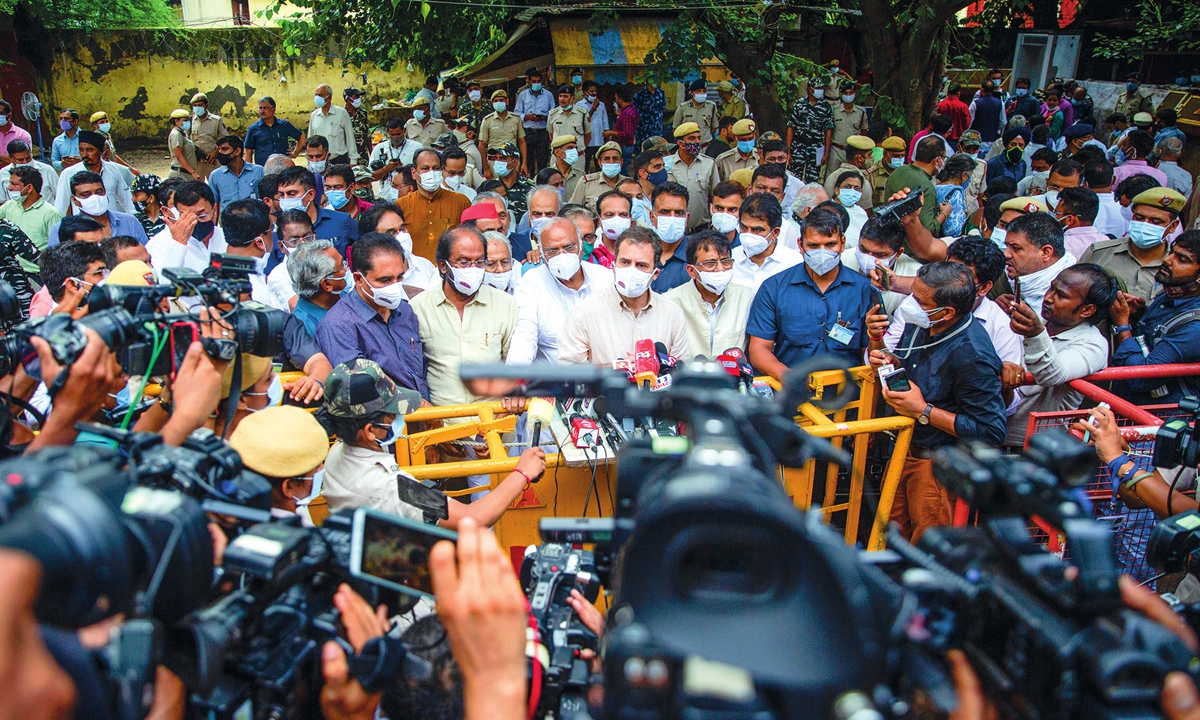
Congress party members express solidarity with farmers on August 6 in New Delhi Photo: AP
Hu told the Global Times that winning more than half of seats in Lok Sabha, the ruling Bharatiya Janata Party (BJP), in 2014, started pushing a "Hindu first" hard-right agenda, stripping Kashmir of its special status, approving the Citizenship Amendment Bill, and launching agricultural reform, which further caused ethnic antagonism and brought farmer protests that continue to this day.
The Indian government is unlikely to propose a solution to the current contradiction of the large gap between the rich and the poor, and the social development of India will still be pyramid-based, said Hu. "India's current political party system is unable to implement wise policies for the long-term development of the country."
Observers said that election bribery and fraud are prevalent at all levels in India, in most cases, votes have become a commodity, with only the powerful being able to get elected. The Indian people do not have the right to monitor the government, and even in the case of man-made disasters such as the ineffective fight against the epidemic, few officials are held accountable.
Qian told the Global Times that the number of parties in India is among the largest in the world, with about 700 various parties at its peak, and even many locals couldn't name them all. Parties send out gifts to attract votes, and there was even a stampede tragedy as people rushed in to grab ballot gifts.
But these smaller parties are in fact incapable of governance, and once they participate in decision-making, the tragedy or chaos starts all over again.
